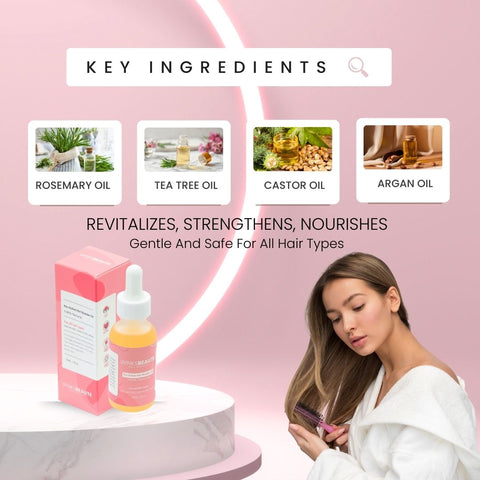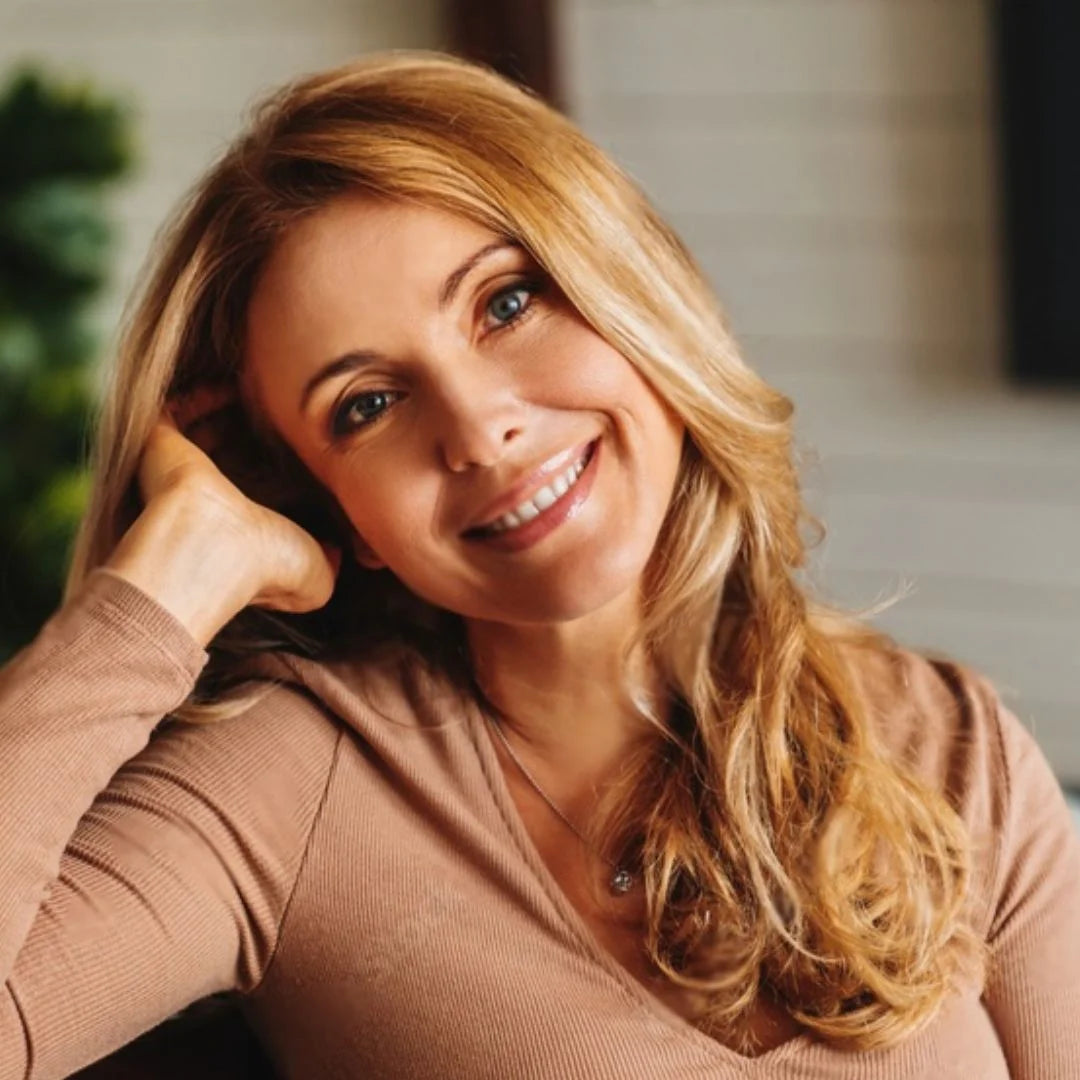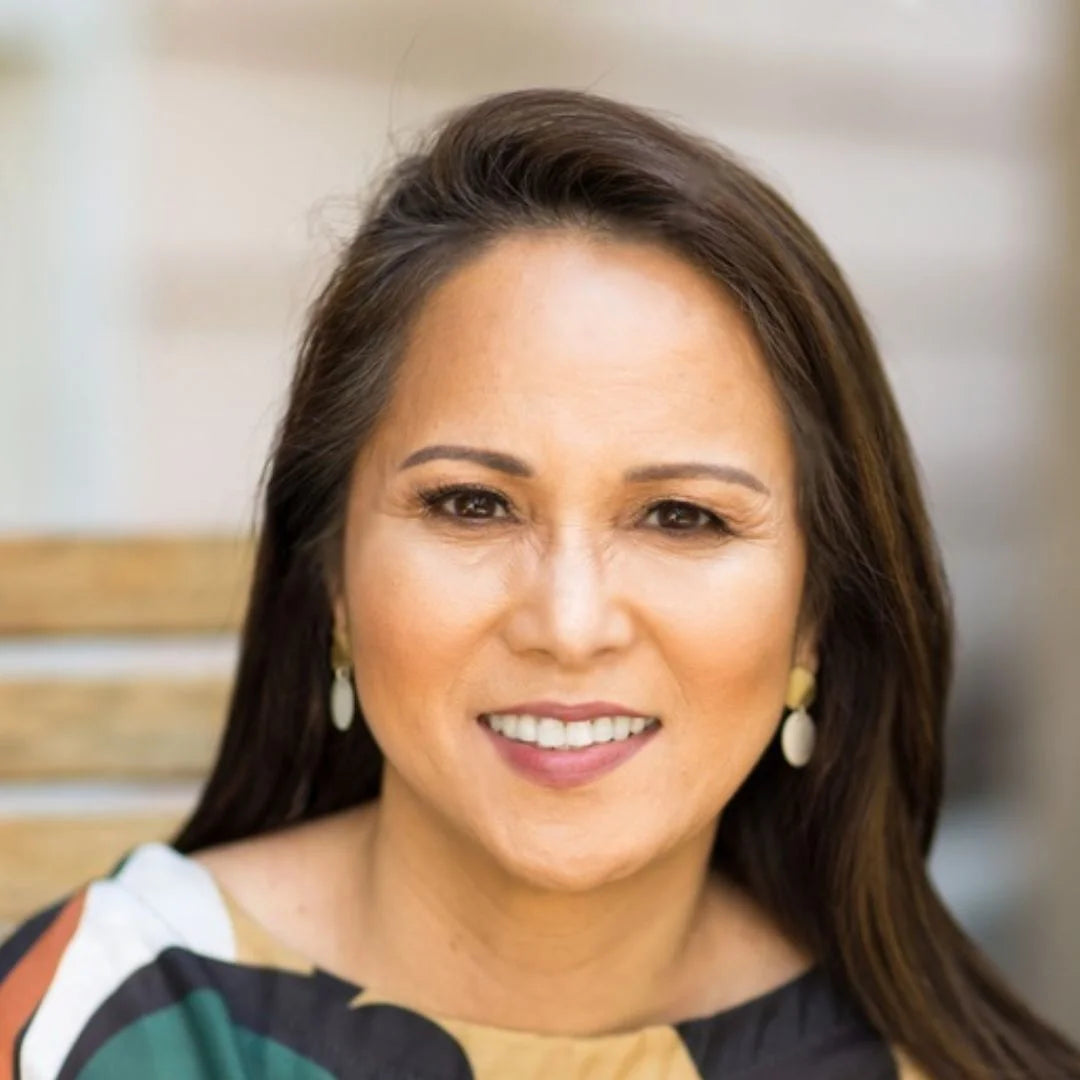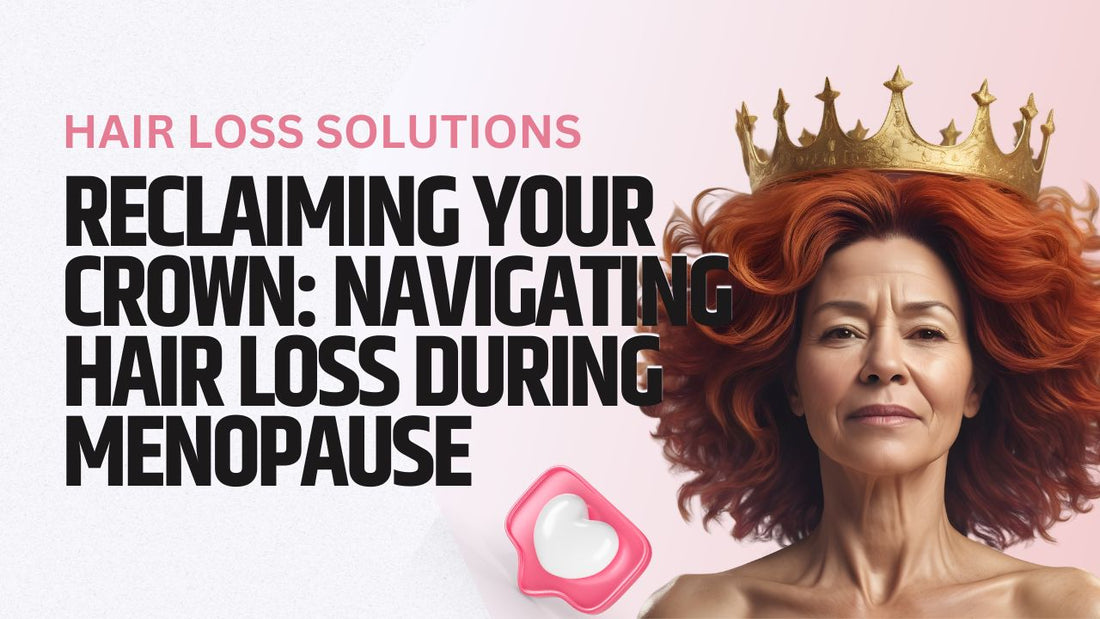
Reclaiming Your Crown: Navigating Hair Loss During Menopause
Share
Menopause signals a significant transition in a woman's life, bringing about profound changes that extend far beyond the cessation of menstrual cycles. Among these transformations, one of the most noticeable and, often, most distressing is hair loss or thinning. Yet, what if this period could also herald a new era of wellness and self-care, an opportunity to engage with our bodies and our health in ways we hadn't considered before? Let's delve into this journey together, armed with empathy, understanding, and actionable advice to illuminate the path of menopausal hair care.
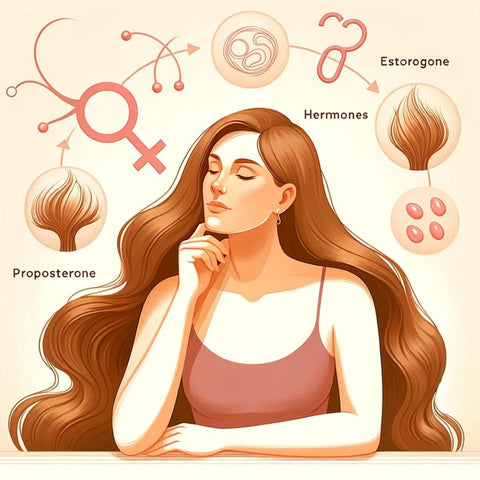
Understanding the Ties Between Menopause and Hair Health
The journey through menopause is as unique as the individuals who experience it, marked by a constellation of symptoms that reflect significant hormonal shifts within the body. As estrogen and progesterone levels decline, many women notice changes in their hair's texture, volume, and overall health. This shift can often feel like yet another challenging aspect of menopause, but with the right knowledge, it's possible to navigate these changes with grace and empowerment.
Menopause doesn't just alter the body's hormonal landscape; it invites us to rethink our relationship with our health and well-being. Recognizing the connection between these hormonal changes and hair health is the first step in crafting a proactive approach to care. Armed with this understanding, we can move beyond the myths and misconceptions that often surround menopausal hair loss, opening the door to effective, nurturing strategies.
Transitioning now into how we can combat these changes, it's essential to debunk some of the myths that cloud our understanding of menopausal hair health.
Busting the Myths Surrounding Menopausal Hair Loss
Let's dispel some common myths right off the bat. The notion that hair loss during menopause is untreatable, or that it marks an irreversible decline in one's appearance, couldn't be further from the truth. While hormonal fluctuations can indeed impact hair growth and health, the narrative doesn't end there. With a blend of nutritional support, stress management, and tailored hair care routines, it's entirely possible to maintain—and even enhance—hair vitality during menopause.
Understanding that menopausal hair loss is not a one-size-fits-all phenomenon is crucial. It's influenced by a variety of factors, including genetics, nutrition, stress levels, and overall health. By approaching this challenge with a multifaceted strategy, we can not only address hair loss directly but also enhance our overall well-being in the process.

Crafting Your Personalized Hair Care Regimen
Embarking on a journey to maintain and enhance your hair's health during menopause is akin to crafting a personalized artwork; it requires attention, care, and the right tools. The cornerstone of this masterpiece? Nutrition, stress management, and a gentle hair care routine.
Nutrition: The Foundation of Hair Health
The significance of nutrition for hair health cannot be emphasized enough. Imagine your body as a garden; just as plants need the right balance of nutrients to grow, so does your hair. Integrating a diet rich in vitamins, minerals, and proteins acts as the perfect fertilizer for your burgeoning locks.
Focus on foods high in iron (like spinach and lentils), zinc (such as pumpkin seeds and beef), and vitamins A, C, E, and D. Don't forget about omega-3 fatty acids found in fish, flaxseeds, and walnuts, which are essential for maintaining a healthy scalp and lustrous hair. By nourishing your body from within, you're laying down the foundations for hair that not only looks vibrant but is stronger and more resilient against the changes menopause brings.

Stress Reduction: Soothing the Mind to Nurture the Hair
Stress is not just a feeling; it's a physical response that can significantly affect our bodies, including our hair. During menopause, when the body is already navigating a sea of hormonal changes, stress can exacerbate hair loss. Finding your sanctuary of peace becomes crucial. Whether through meditation, yoga, walking in nature, or journaling, reducing stress is a vital step in your hair care regimen. These activities not only soothe the mind but also promote hormonal balance, indirectly fostering a healthier hair growth cycle.

Gentle Hair Care: The Art of Nurturing Your Locks
Adopting a gentle approach to hair care is crucial during menopause. This phase of life calls for kindness and patience, extending to how we treat our changing hair. Opting for mild, nourishing hair care products can make a significant difference. It's also an opportune time to reassess hair care routines, minimizing the use of harsh chemicals and heat styling tools that can further damage delicate hair.
Incorporating hydrating and strengthening ingredients, such as natural oils and proteins, can help maintain hair's health and resilience. Regular trims also play a part in keeping hair looking its best, preventing split ends and encouraging healthy growth. Remember, the goal is to support and protect your hair, allowing its natural beauty to shine through, even as it changes.
Introducing a Game-Changer: Proactive Rosemary Hair Booster Oil
A noteworthy ally in our quest for luscious locks during menopause is the Proactive Rosemary Hair Booster Oil. Infused with a powerful blend of natural oils, this product is a testament to the healing and rejuvenating properties of nature. Rosemary oil, known for its ability to stimulate hair growth and improve scalp health, serves as the cornerstone of this blend, accompanied by nourishing companions like grape seed, castor, and jojoba oils.
The application is straightforward and user-friendly: simply massage the oil into your scalp and through your hair, leaving it to work its magic without the need for dilution. This ritual not only nurtures your hair but also offers a moment of self-care, a reminder of the importance of taking time for yourself during this transformative period.
Forward with Grace: Reframing Menopause and Hair Care
As we near the conclusion of our journey, it's important to recognize menopause not just as a series of physical changes, but as an opportunity for growth and self-discovery. This period can serve as a catalyst for adopting a more holistic approach to health and well-being, with hair care being a significant, yet singular, aspect of this broader perspective.
Embracing the changes menopause brings, with all its challenges and surprises, allows us to approach life with renewed grace and resilience. Our hair, as with our bodies, may evolve, but so too does our capacity for self-care, adaptability, and empowerment. By nurturing ourselves with kindness, patience, and the right tools, we pave the way for a future where we not only adapt to change but thrive amidst it.
FAQs: Your Questions, Answered
Can hair loss during menopause be reversed?
While reversing hair loss completely may not be possible for everyone, many women find that through targeted care, including nutrition, stress management, and gentle hair treatments, they can significantly improve the health and appearance of their hair.
How long does hair loss last during menopause?
The duration of hair loss during menopause varies from person to person. For some, it may be a temporary phase, while others may notice ongoing thinning that stabilizes over time. Focusing on overall health and targeted hair care can help manage this condition.
Are there any side effects to the treatments mentioned?
Natural treatments like the Proactive Rosemary Hair Booster Oil typically have minimal side effects. However, individual reactions can vary. It's always a good idea to conduct a patch test when trying a new product and consult with a healthcare provider if you have concerns.
Can changes in diet alone improve hair health?
Diet plays a crucial role in hair health, providing the nutrients needed for growth and vitality. While it's a powerful tool in your arsenal, the most effective approach combines nutrition with stress management and appropriate hair care practices.
How can I tell if my hair loss is due to menopause or another condition?
Distinguishing menopausal hair loss from other causes can be challenging. If you're experiencing significant hair loss or other symptoms, consulting with a healthcare provider can help identify the underlying cause and guide you toward appropriate treatment options.
As we conclude this guide, remember that menopause is a natural part of life's journey, bringing with it challenges, yes, but also opportunities for growth and renewal. By approaching this phase with knowledge, care, and a dash of optimism, you can navigate the changes with confidence, embracing wellness in all its forms.

